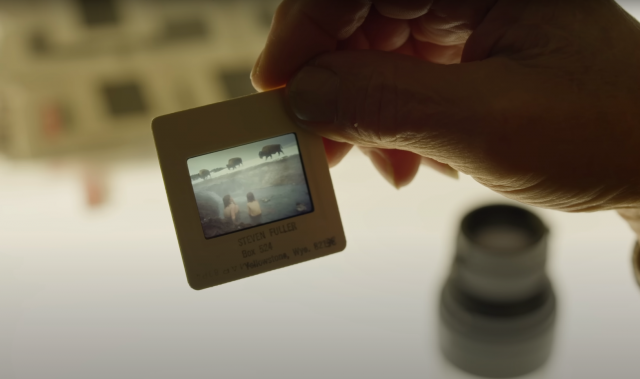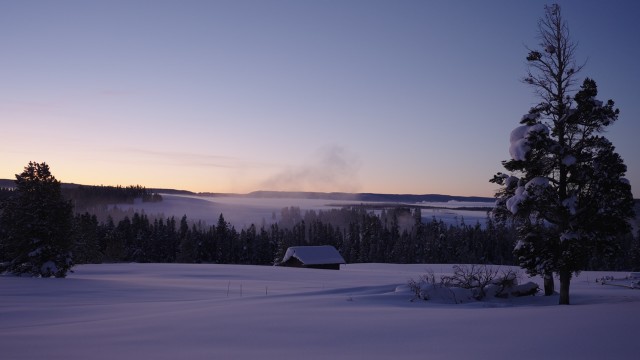Whenever attempting to sum up the characteristics of a short film that tends to “work” online, discussions often revolve around pacing, as there is a prevailing belief that online audiences need to be hooked early or lost forever. However, recent shifts towards mindfulness and a general desire for life to slow down a little suggest a growing acceptance for more contemplative filmmaking in the online sphere, especially when coupled with a meaningful message. Guardian doc, The Winterkeeper by Laurence Topham & David Levene, exudes these qualities, providing a viewing experience that will have audiences yearning for a simpler life.
The life in question, which will have many of us examining our own existence, is that of Steven Fuller, the winter caretaker of Yellowstone national park. An outdoorsman with a special connection to the natural world, Fuller spends the 13-minute duration of The Winterkeeper regaling us with tales from his past and his present, one eye on not only his own future, but that of the park he’s lived in for the past 50-years. The engaging qualities of the film are certainly helped by Fuller’s rich vocal tones and a large archive of personal photography, which Topham & Levene use throughout the film.

Fuller’s archive of personal photos play a pivotal role in the film’s intimate feel
Speaking to the filmmakers about why they decided to focus their latest short on Fuller, Topham reveals he was inspired to make the Yellowstone worker the subject of his short after reading an article by Todd Wilkinson, who profiled the man as part of the Guardian’s The Age of Extinction project. Starting the process of trying to capture his life on-screen, the filmmakers began to correspond with Fuller and after he shared some of those aforementioned personal photographs, they had an impact on the pair which would prove vital in shaping their film.
“I suppose it’s easy to romanticise old photographs, but what Steve shared with me had a profound effect”, Topham explains. “He and his family enjoyed a truly unique, unfiltered and sustained connection to the natural world, unburdened by the buffers and distractions of the modern world. Yellowstone was, quite literally, their back garden — only this garden had bison and bobcats, no visible fence or boundary, and typical family activities included ice skating on frozen lakes, or going to hot springs along buffalo trails. Most of us would be lucky to experience that for a few days, let alone a whole childhood”.
“I really wanted the intimacy I experienced to come through in the finished piece”
Capturing Fuller’s 50-years at the park is no easy feat and it’s to Topham & Levene’s credit that they manage to do an excellent job in just under 13-minutes, especially when considering the leisurely pace of their film. With Levene living with Fuller for eight days, making him the longest-staying guest he’s ever had (except for family members), the close, intimate nature of their shared living space was something that proved inspirational in their approach to filming. “I really wanted the intimacy I experienced to come through in the finished piece”, Levene explains, adding that they “used that time to get to know one another and begin to feel comfortable as observer/observed”.
Deciding to shoot hand-held for the first morning, as Levene believed it would allow him to better “respond to Steve’s movements around the cabin”, the filmmaker soon realised that “the pace of Steve’s life and the calm, almost soundless snowy landscapes would require more of a still, contemplative approach to camerawork”. After that realisation, the majority of the footage for the film was shot on tripod, or a gimbal whilst moving out in the landscape. While the setting and environment of Fuller’s home proved inspirational for the style of filmmaking employed in the short, it also provided many a challenge for Levene, who had to learn how to ski (which he described as “incredibly difficult and exhausting”) and operate his equipment at “punishingly low temperatures”.

The Yellowstone setting serves almost as an additional character in the narrative, it’s precarious future a main talking point.
The struggles and challenges certainly proved worthwhile though, with The Winterkeeper not only a fascinating profile piece, but also an eye-opening insight into climate change. It’s this duality that makes the short so powerful and memorable, the film having qualities that make it both meditative and motivational in equal measure, as Topham explains:
“Steve’s half-century tenure at Yellowstone meant he is in a truly unique position of bearing witness to the impact of the climate crisis on some of our most treasured, and vulnerable, wild spaces. I wanted our documentary to explore this theme, but I also knew I wanted to tell an intimate human story. So the film tries to work on both of these levels; it’s ostensibly about the fragility of the natural world, but it’s also about the fragility and transience of human relationships.”

 Rob Munday
Rob Munday